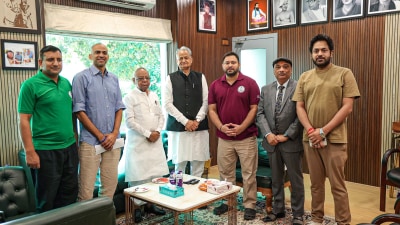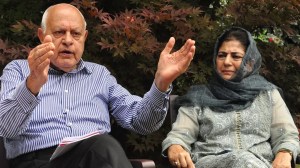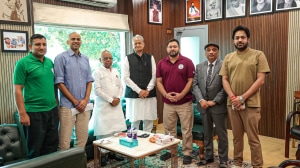Cross-border flights from New Year, train next on line
Ending a two-year-old impasse, Pakistan threw open its airspace from January 1 to allow Prime Minister A B Vajpayee to fly directly to the S...

Ending a two-year-old impasse, Pakistan threw open its airspace from January 1 to allow Prime Minister A B Vajpayee to fly directly to the SAARC summit a couple of days later, even as both sides began to prepare the ground for additional communication links, including the Samjhauta Express and the bus across the Line of Control from Srinagar to Muzaffarabad.
The announcement to simultaneously restore point-to-point services as well as allow overflights through Pakistani airspace was made today in the capital after a meeting between civil aviation officials from both sides.
Although General Pervez Musharraf had yesterday in Islamabad already stolen the thunder by unilaterally announcing a lifting of the overflight ban, New Delhi played its part by agreeing to enhanced airlinks between Pakistani and Indian cities.
Significantly, the Pak side did not insist on a guarantee—as it had done in the previous talks on August 24—that India never stop air services to Pakistan again.
Clearly, though, the end of the overflight ban will benefit New Delhi more than Pakistan, since most of its flights—110 flights a week to the Gulf, to Europe and to the US—needed to fly through Pakistani airspace. Estimates are that India lost Rs 80 crore monthly over the last two years as a result of the ban.
Since New Delhi had earlier linked the end to the overflight ban to the resumption of passenger train links, official said talks would be held very soon to revive the Samjhauta Express between Amritsar-Lahore.
Moreover, New Delhi will also decide over the next few days how best to deal with a Pakistani proposal on the three new communication links. These are, the ferry service from Mumbai-Karachi, the bus/train from Khokhrapar to Munabao across the international boundary in Rajasthan (a pre-Partition train gauge already exists) and the bus from Srinagar to Muzaffarabad across the Line of Control in Kashmir.
The Pakistani side has said that it will be ready to hold talks on all three links as early as mid-December.
It also seems that New Delhi has agreed that talks on the Srinagar-Muzaffarabad bus and the Khokhrapar-Munabao link can take place in Islamabad while it is willing to host talks on the Mumbai-Karachi ferry service.
Clearly, with Musharraf going over the head of his bureaucracy and unilaterally ending the overflight ban, analysts here say they ‘‘will be overwhelmed, but not surprised’’ if Islamabad allows a bus to start across the Line of Control.
Officials here also conceded Pakistan PM Jamali ‘‘took a big step forward’’ a week ago by publicly dropping all mention of ‘‘UN documents’’ that passengers must hold during his Sunday speech. Instead, he stressed the need to discuss ‘‘all modalities’’ by both sides. A number of options are at hand, including the use of passports that is likely to be favoured by New Delhi. But whatever the final result, stamping of travel documents at the LoC will necessarily indicate ‘‘areas of control’’ by each government. In that sense the LoC, analysts say, will likely become an informal border between the two countries.






- 01
- 02
- 03
- 04
- 05

























